U. hosts 20th annual Spring Thaw Powwow
powwow features dance performances, booths selling artisan goods, celebrates community
BY INDIGO MUDBHARY SENIOR STAFF WRITER
The Native American Heritage Series at the Brown Center for Students of Color and Natives at Brown hosted the 20th annual Spring Thaw powwow at the pizzitola Sports Center this Saturday.
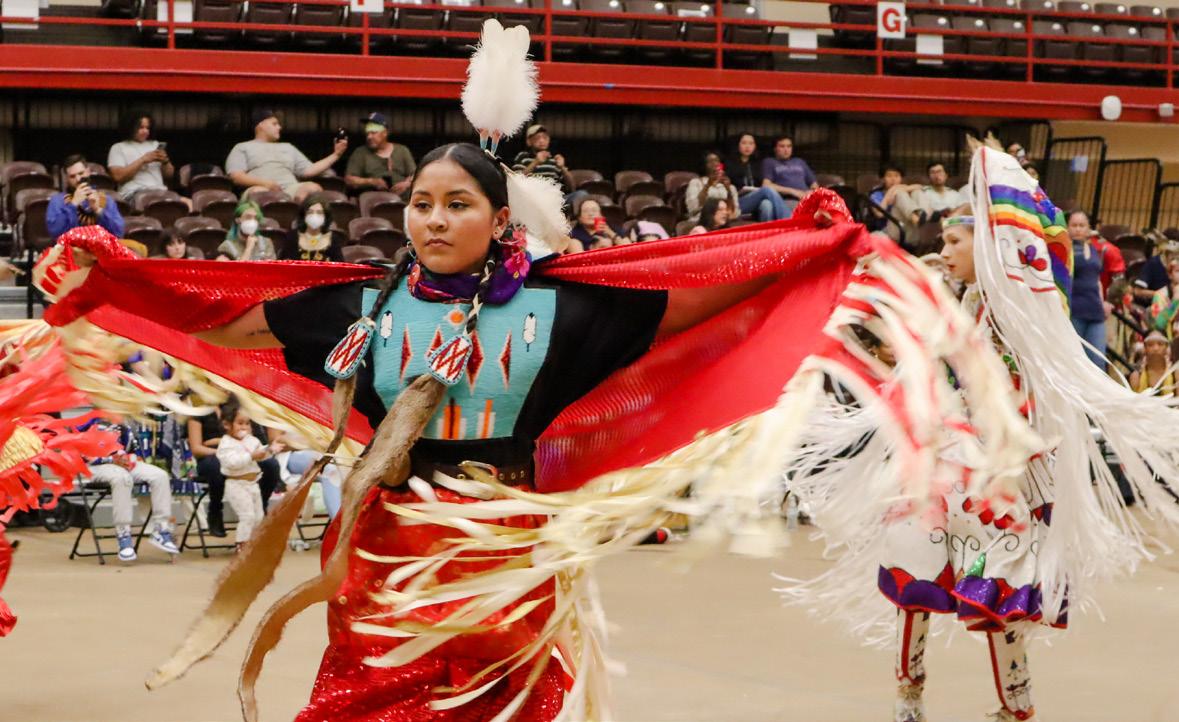
The powwow featured food, dance performances and booths where Indigenous artisans sold their jewelry, clothing and other handmade goods to provide Indigenous community members the opportunity to reunite and celebrate the arrival of the spring season.
This year’s Spring Thaw powwow was organized by Ashlyn Lovato ’23 and Kalikoonāmaukūpuna Kalāhiki ’24.
‘Transforming spaces into sacred spaces’: Organizing the Powwow Kalāhiki and Lovato began planning the powwow last October, according to Kalāhiki, with support from Anne-Marie ponte, BCSC coordinator for co-curric-
UNIVERSITY NEWS
ular initiatives.
“Ashlyn has really spearheaded all of this,” Kalāhiki said. “This wouldn’t be possible without her.”
Kalāhiki described the event planning as a “very involved” and “educational” process. “It’s cool because my first Powwow is one that I’ve helped to organize.”
Kalāhiki said that planning the event made them “feel grounded.”


“I miss home as a Native person,” they said. Being “around other Indigenous people who are very rooted in
Edie B. Fine ’25 expresses queerness with performance
Fine
BY DANA RICHIE SENIOR STAFF WRITER
Edie B. Fine ’25 remembers being very feminine in “an extremely performative, silly, ridiculous way” at five years old — when they vowed to “only wear pink dresses for the rest of (their) life.”
When Fine began to come to terms with their queerness and the expansiveness of their gender identity, they struggled to reconcile how this femininity fit into the picture. Reflecting upon their “childhood obsession with pink” over a decade later, Fine said they realize that they “clearly loved the performance of it all.”
Fine said that their love for performance comes from witnessing drag throughout their childhood. Driven by an “excitement to explore,” Fine began to experiment with drag in their high school bedroom: “I (wanted) to dance in my house with this crazy transformation.”
Drag “was a way to combine my
love of visual art and also performance and dance embodiment and glitter and queerness and genderf*cking,” they said.
While at Brown, Fine has only expanded their excitement for drag, finding and creating queer collectives that enable their love for performance art, subverting the gender binary and “destabilizing an essentialized idea of the body.” They co-direct the Brown poler Bears, Brown’s pole dancing troupe, lead Burlesque at Brown Et Cetera and create their own art.
Fine discovered their passion for dance during an elementary school movement class, where they loved “being in touch with (their) body.”
At Brown, they concentrate in Theatre Arts and performance Studies on the dance track, as well as American studies.
As a classically trained dancer, Fine was eager to explore pole dancing as a new medium of expression in college. After learning about the poler Bears, Fine said they grew obsessed with the group before even setting foot on campus.
Once at Brown, “it took a lot of
their culture, very rooted in their language and very deeply connected to their lands makes me feel connected back to my home even though I’m so far away.”
Kalāhiki hopes that the event can create a sacred space within an Ivy League institution “that has caused and perpetuated … settler colonialism.”
“This is Narragansett land. And part of being a Brown student … is understanding that we are settlers contrib-
ARTS & CULTURE
SCIENCE & RESEARCH
Nine U. faculty honored for distinguished research
tant director for limited submissions and internal funding at the Office of Research Development, wrote in an email to The Herald on behalf of the department.
BY MIRA WHITE SENIOR STAFF WRITER
Nine University faculty members received the 2023 Research Achievement Awards for their efforts to advance “knowledge to make a difference in the world,” according to the University’s website. Recipients of both Early Career Research Achievement Awards and Distinguished Research Achievement Awards were chosen from the categories of humanities and social sciences, life sciences and public health, physical sciences and hospital-based research.
Award recipients will receive a stipend of $5,000 to support their research. The stipend helps to elevate “the University’s recognition of the extraordinary research contributions of faculty,” Margaret Manning, assis-
Established in 2017, the Research Achievement Awards “recognize the exceptional achievements and the global impact of research by Brown faculty,” Manning wrote.
To be eligible for the Research Achievement Awards, applicants must be nominated by their peers. These nominations “are reviewed by panels of distinguished Brown faculty” that are “convened by the vice president for research and configured each year to avoid direct conflicts of interest,” according to Manning.
For the Early Career Research Achievement Awards, faculty members must be at the assistant professor level and have scholarly achievements in “publications” or “funded research.”
For the Distinguished Research Achievement Awards, nominees must
Ensemble performs ‘Tick, Tick... Boom!’
BY SOFIA BARNETT UNIVERSITY NEWS EDITOR
Ensemble Theatre’s production of Jonathan Larson’s “Tick, Tick… Boom!” hit the stage with three performances this past weekend in Alumnae Hall.

Ensemble’s production began with cast members walking the perimeter of the stage in a pencil-straight line, expressionless and silent. As they took their seats — desk chairs clustered on either side of the stage — they began to chant in unison: “Tick. Tick. Tick.”
Theodore Young ’25 played the show’s lead character Jon. He opened the play with an earnest monologue on fears and dread toward the looming approach of his 30th birthday, inviting audience members directly into his psyche. Young establishes the show’s plot early-on and audience members are thrown into a whirlwind of angst and desperation that follows the story of a promising young playwright who is forced to grapple with whether he really has promise. Intimate and relatable, Ensemble’s “Tick, Tick… Boom!”
explores themes of prodigal burnout, fear of failure, hustle culture and the internal ticking of the clocks within every audience member.
Director Nathanael Winoto ’25 said that the show is intimate by nature.
“The fun thing about ‘Tick, Tick… Boom!’ was that it was initially conceived as a one-person review where Jonathan Larson would just play the music on his own,” he said. After Larson’s production of “Rent” found success, “Tick, Tick… Boom!” expanded into a three-person musical with the
help of David Auburn before being produced as a film directed by Lin-Manuel Miranda, Winoto added.
“Tick, Tick… Boom!” is the first show Winoto has directed.
“It’s kind of funny because I’ve always wanted to direct the whole musical,” he said. “I had the idea one day in the shower while listening to a theater playlist.”
While listening to the show’s opening song “30/90,” Winoto “just got

THE BROWN DAILY HERALD BROWNDAILYHERALD.COM SINCE 1891 M ONDAY, Ap RIL 17, 2023
Page 3 Controversial
at Harvard, Title IX
Rutgers
Page 6
Page 4 University News University News Sports 51 / 59 46 / 58 TODAY TOMORROW Wellisch ’26: We must appreciate idle time alongside work Page 7 Commentary DESIGNED BY MAX ROBINSON ’26 DESIGNER JOYCE GAO ’24 DESIGNER MADDY CHERR ’23 DESIGN EDITOR VOLUME CLVIII, ISSUE 32
Mahjong Club hosts its spring tournament, second this school year
donation
at princeton,
strike
Baseball swept by Penn in three-game set, continues losing streak
shares passion for dance, drag, fostering queer community on campus
UNIVERSITY NEWS
Recognized research includes environmental studies, anthropology
Show asks students to decide ‘if you want to live your life guided by love or fear’
SOFIA BARNETT / HERALD
The show was the first time that Nathanael Winoto ’25 has directed a show. He was inspired after listening to the soundtrack.
CLAIRE DIEPENBROCK / HERALD
The 20th annual Spring Thaw Powwow included a variety of vendors selling food, jewelry and other handmade products. SEE POWWOW PAGE 8 SEE RESEARCH PAGE 2
SEE ENSEMBLE PAGE 5 SEE FINE PAGE 3
be at the rank of full professor and meet the same criteria as the early career faculty, but also have “evidence of national and/or international recognition for research within the last few calendar years,” Manning wrote.
“I was delighted to see my work recognized,” wrote Assistant p rofessor of History and Environment and Society Brian Lander, who received an early career research award, in an email to The Herald.
Lander’s research focuses on how people in China have transformed the country’s natural environment “into ecologically simplified agricultural landscapes” over thousands of years. Lander hopes to “reconstruct the history of these topics that were previously neglected.”
Lander is currently writing an environmental history on the Yangzi River and aims to build on his research by exploring the “history
of aquaculture in China.” With his stipend, he hopes to travel to China this summer to complete field work.
Lina Fruzzetti, professor of anthropology, recalled that she was “a little bit surprised” to learn she had received the distinguished research award.
“One doesn’t do all this work to be recognized. I was thankful, of course. (But) one just does the work to see how it impacts the world that you live in,” Fruzzetti said.
Fruzzetti conducts research on India, North East Africa and Italy. Much of Fruzzetti’s work has been in the form of documentaries.
In her documentary “In My Mother’s House,” Fruzzetti details her life story as the daughter of an Italian father and Eritrean mother, hoping to shed light on a family living under colonial rule. Fruzzetti hopes to use her stipend to go back to India and Eritrea to finish another documentary.
Jonathan p ober, assistant pro -
fessor of physics, was recognized with an early career research award for his work on “the evolution of the universe focusing on radio waves.”
“I was very excited to win the award,” he wrote in an email to The Herald. “There are so many researchers at Brown doing so many exciting things (that) it’s really an honor to even be in the conversation for an award like this.”
As a cosmologist and radio astronomer, p ober’s research includes the “analysis of data from the Murchison Widefield Array, designing radio telescopes for the far side of the moon and developing machine learning techniques” in his field.
In the future pober hopes to use radio telescopes that can detect signals from when stars were first forming. With his stipend, p ober wrote he wants to better support graduate students. “Developing the next generation of researchers is
one of the most important aspects of my job.”
Diane Lipscombe, director of the Carney Institute for Brain Science and professor of science and neuroscience, was “overwhelmingly thrilled and humbled” when she received the award.
Lipscombe was “thrilled to be receiving this Distinguished Research Achievement Award with such incredible faculty … students, postdocs (and) technicians,” she wrote in an email to The Herald. “This is their award as much as it is mine.”
Lipscombe primarily explores electrical signals in relation to the health of the nervous system, focusing on “neurodegeneration, chronic pain and psychiatric diseases.” Her work with these diseases has led to an interest in understanding
“how neurons can transition from adaptive to maladaptive responsive states.”
Lipscombe is already involved
with multiple projects on neuron-immune pathways and new technologies to regulate neurons. Lipscombe hopes to continue with research that will further neuroscientists’ understanding of neuron responsiveness to chronic pain and neurodegenerative diseases.
With her stipend, she hopes to support “the students and postdocs in the lab to help them attend scientific meetings to present their exciting research.”
The remaining five awards were received by p rofessor of Cognitive, Linguistic and p sychological Sciences Oriel FeldmanHall, p rofessor of Medicine Alan Morrison, p rofessor of p sychiatry and Human Behavior Mary Carskadon, p rofessor of Social Science, Anthropology and Italian Studies David Kertzer ’69 and p rofessor of Applied Mathematics Chi-Wang Shu.
The nine recipients of the 2023 Research Achievement Awards will be honored April 24.
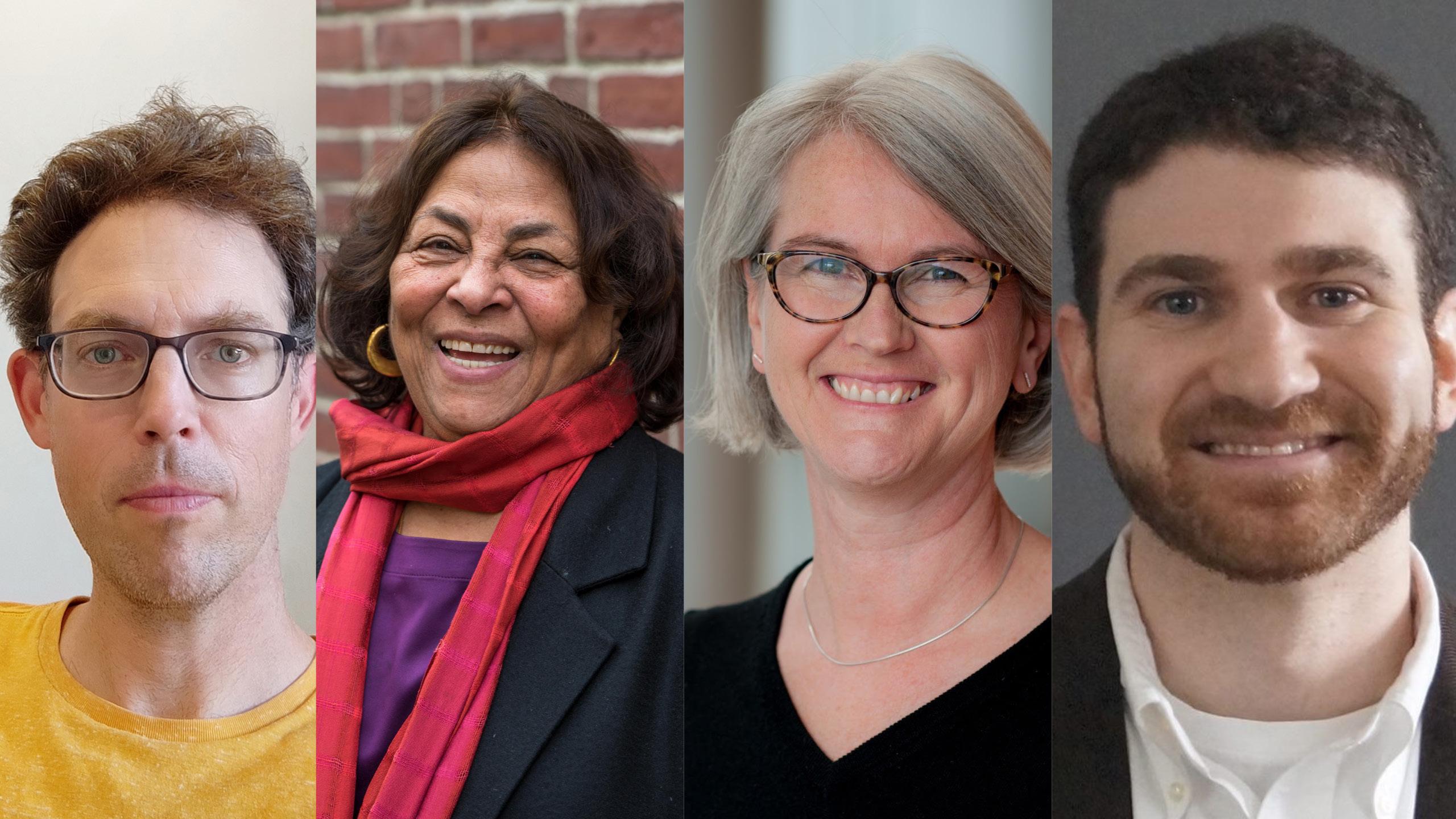
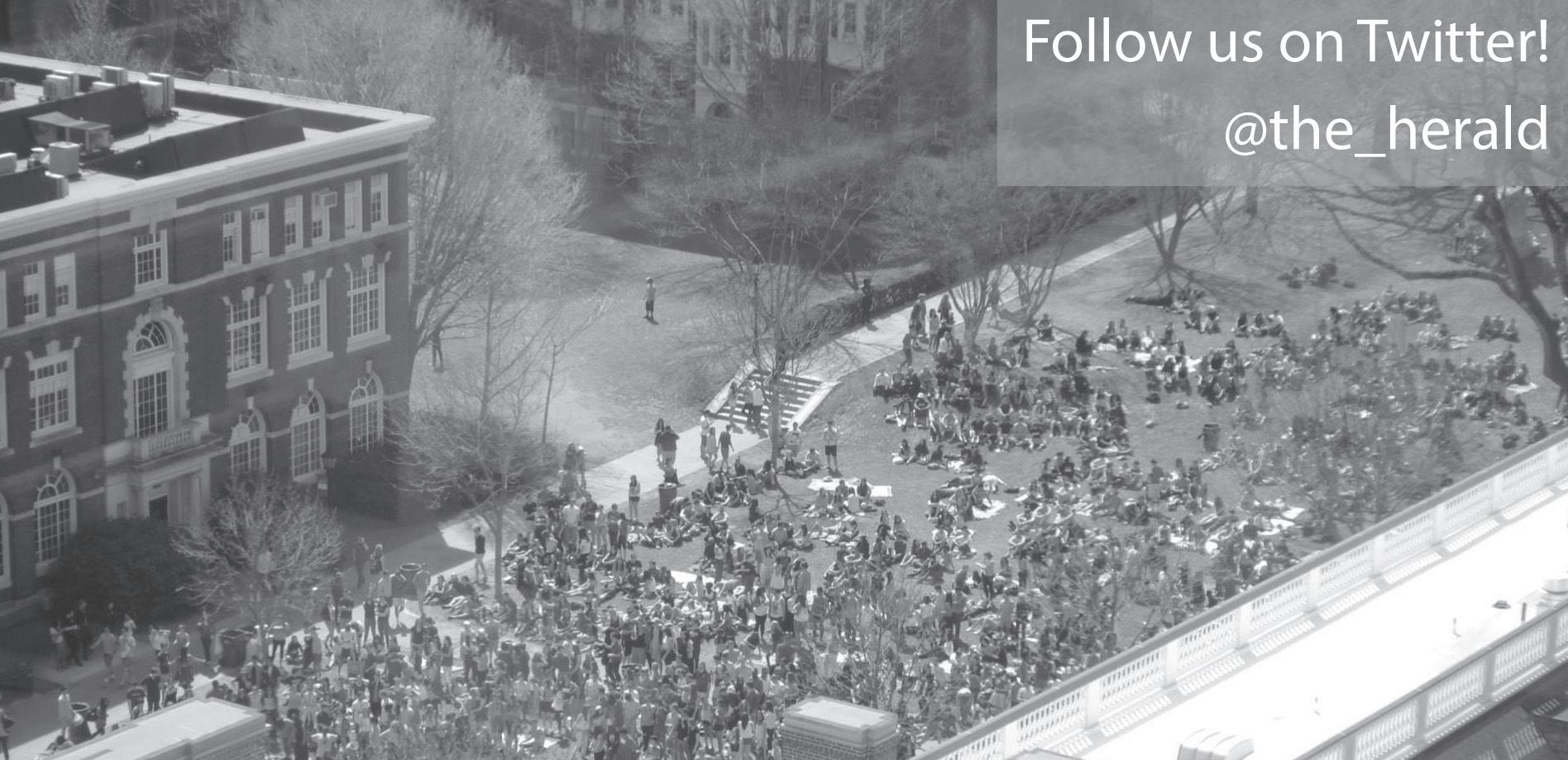
2 M ONDAY, Ap RIL 17, 2023 THE BROWN DAILY HERALD | NEWS
RESEARCH FROM PAGE 1
COURTESY OF SHERRI MILES
To be eligible for the Research Achievement Awards, applicants must be nominated by their peers. Nominations are then reviewed by panels of distinguished Brown faculty.
UNIVERSITY NEWS
36 students competed for $150 in prizes in round-robin tournament
BY KELVIN JIANG
SENIOR STAFF WRITER
Mahjong Club hosted its spring tournament Saturday evening in the Underground of the Stephen Robert ’62 Campus Center.
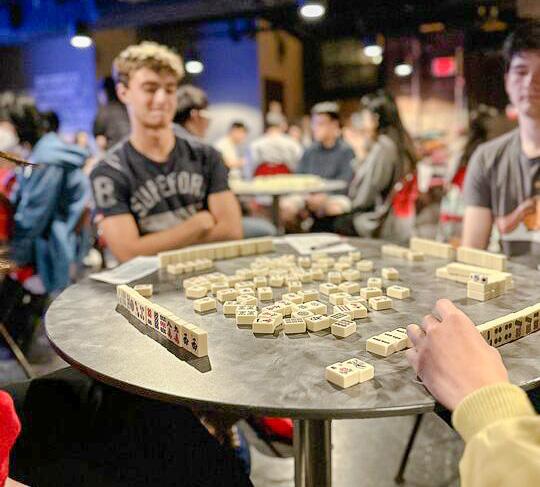
The 36 tournament attendees competed for $150 in prizes, according to executive board member Kathy Li ’24. The first, second and third-place winners received $75, $50 and $25 gift cards, respectively.
According to Makoto Kobayashi ’23, another member of the group’s executive board, the rules for the tournament were a “simplified” Hong Kong style that Mahjong Club had already been using at club meetings. Every competitor played three matches, each of which consisted of four rounds. “E-board members … hopped in and out of games to fill in for empty spots,” Alanna Zhang ’25, a member of the club’s executive board, wrote in an email to The Herald.
Tournament winner John Wu ’24 thought the overall experience was “really fun,” even though “it was different from Riichi Mahjong,” a more complicated style which he normally plays.
Kobayashi said that the tournament’s round-robin format with random seatings allowed participants to compete without much waiting. In past competitions, when a bracket-style tournament was used, only four competitors were playing at the end, he explained.
Zhang explained that this was the club’s first spring tournament, and that this year’s event also was also free. The club typically hosts a fall
FROM PAGE
FINE
training for my body to be more vulnerable in a different way,” Fine explained. “It’s embracing sexuality — which is a tough thing for a lot of people. It’s shaking off shame.”
Fine said that the poler Bears is as much a “community space” as it is a dance troupe, which makes the experience even more rewarding. They added that everyone on the team “earnestly cares about the art and history of the work that we do.”
The team welcomes all community members regardless of skill level and strives to find people who are on board with the “sex positivity,” “experimentation,” “silliness” and “sex work advocacy” of it all, Fine said.
Emma Coleman ’25, who joined the poler Bears last year, said that the group “wouldn’t be who we are” without Fine. Though Coleman had a long history of pole dancing before coming to Brown, she said it was the queer representation within the team’s leadership — which includes Fine — that inspired her to try out for the poler Bears.
Fine makes “time for everybody individually,” Coleman said. “Their main priority is to make sure that people feel safe, secure and heard.”
Coleman added that Fine brings an “experimental, fluid and exciting” energy to the team through their experience with drag and visual and audio art. “It’s
tournament with a $5 entry fee, according to Li.
“We realized we had (enough funds to) make the tournament free and provide dinner,” Zhang said. “We’re going to request more funds to make
such a fierce, ferocious vibrancy that they have.”
Fine has found many other ways to express themself through movement and performance on College Hill. They helped revitalize the drag performance infrastructure on College Hill last year by founding BABE.
Alongside roommate and co-organizer Lola Aguiar ’25, Fine coordinated “Semiotic Erotica” — a burlesque, drag and performance art event to celebrate both of their birthdays. The pair gathered various friends and artists in the Upspace on April 8 for an evening of “genderf*ckery.”

“We just really wanted to perform together and provide the gayest, queerest (and) trans-est space for the community at Brown,” Aguiar said. “The entire audience just went crazy with Edie’s number. … You could see that they knew what they were doing and were rocking it.”
“It was one of the most freeing and liberating experiences of my life,” Fine said. “I was basically naked on stage, and I felt so comfortable.”
Fine said that, at times, they feel like “everything” has led them towards producing “genderf*cking” art.
it free” in future semesters, Li said. Competitors had a wide range of experiences with Mahjong before the tournament. Dun Jian Chin ’25 has played for years with his family, while Caterina Dong ’24 started to play last
fall. “people were very nice here, very welcoming. I stayed through the whole tournament,” Chin said, though both Chin and Dong noted that the environment got competitive at times.
For Wu, the thrill of the game was
KELVIN JIANG / HERALD
M ONDAY, Ap RIL 17, 2023 3 THE BROWN DAILY HERALD | NEWS
“Edie is this creative force, more than anything,” Aguiar said. “Edie drinks from creativity. Everything they do is related to art, and their mode of living is through art.” 1
Students compete at Mahjong Club spring tournament
the tournament’s appeal. “What I enjoy the most (about Mahjong) is that while there is a lot of skill involved, a lot of it comes down to luck of the draw — and that’s kind of exhilarating.”
Competitors had a wide range of experience levels with mahjong before the tournament, with some novices and other more experienced players.
COURTESY OF EDIE B. FINE
While at Brown, Edie B. Fine ’25 has found and created queer collectives that fuel their love for performance art, subverting the gender binary and “destabilizing an essentialized idea of the body.”
Baseball swept by Penn at home, losing fourth game in a row
Bears’ pitchers issue 21 walks, hit four batters in three-game weekend set
BY LINUS LAWRENCE SPORTS EDITOR
Men’s baseball (7-21, 4-8 Ivy) dropped three straight home matchups against penn (20-11, 9-3 Ivy) this past weekend after sweeping Cornell on the road last week. They lost by scores of 6-4 Friday, 13-6 Saturday morning and 4-1 Saturday afternoon, allowing penn to move into sole possession of first place in the Ivy League standings.

“Coming in this weekend, we knew it was gonna be a challenge,” Head Coach Grant Achilles said regarding penn’s performance. “They took advantage of some miscues on our part.”
The Bears fell behind early in all three games against the Quakers, surrendering a combined seven runs across the first inning of each game.
Making his third appearance of the season in the Friday afternoon opener, Paxton Meyers ’24 was the only Bears starter to make it out of the second inning. Santhosh Gottam ’25, coming off a career-high seven-inning, eight-strikeout performance last weekend, was tagged for six runs in 1 1/3 innings Saturday morning. Carter Rasmussen ’26, making his first career start on Saturday afternoon, gave up two runs on one hit, three walks and a hit-by-pitch while recording just one out.
Free passes were a problem for Brown pitchers all weekend, with the staff issuing 21 walks and hitting four batters across the weekend.
“We want action in the first three pitches,” Achilles said. “It’s just been kind of a struggle at points this year, and trying to get more consistency there is gonna make a lot of difference for our pitching staff.”
The Bears received good outings from their bullpen throughout the series. Rookie Christian Keel ’26 tossed three scoreless innings Friday, while Dylan Reid ’26 and Bobby Olsen ’23 each set career highs with 11 strikeouts in 6 2/3 innings during
Saturday’s doubleheader. Olsen, who held the Quakers to two runs, had previously started three of the Bears’ seven wins of the season, and said he approached the relief appearance “like every other start.”
“I’m not looking too far ahead,” Olsen said. “Just staying present.”
While their pitching faltered early in games, the Bears’ offense came alive late to make comeback attempts. Trailing 6-0 in the seventh inning Friday, the Bears scored three runs off a two-run single by catcher Jacob Burley ’23 and a catcher’s interference call while Nathan Brasher ’25 was batting. With two outs in the ninth inning, the Bears mounted a rally as Charles Crawford
’24 and Ryan Marra ’23 both got hits and Mark Henshon ’26 — reigning Ivy League Rookie of the Week — knocked an RBI single to bring the winning run to the plate. But the Bears fell short 6-4.
On Saturday morning, the Bears found themselves in an 11-0 hole, but put together a six-run eighth inning with RBIs from Conor Cooke ’25, Reece Rappoli ’24, Gunner Boree ’25 and Derian Morphew ’23, eventually losing 13-6. The game also saw Burley extend his on-base streak to 22 games before failing to reach in the series finale.
Over the first two games of the series, Bruno’s bats recorded 22 hits but left 25 runners on base. “We are
CALENDAR
a competitive offensive team,” said centerfielder Morphew. “We’ve outhit a lot of teams. I think the only thing we’re missing is a completely defensive game.”
In the third game, the Bears ran into the buzzsaw right arm of penn sophomore Ryan Dromboski. With a 2.44 ERA this season, Dromboski stifled the Bears’ lineup, throwing a complete game while striking out 12 and allowing one run.
Dromboski had a “competitive fastball of course (and) a pretty good changeup, but I think the slider is what hurt a lot of guys today,” Morphew said.
Through the first eight innings, Dromboski allowed just one hit — a
TODAY’S EVENTS
Joint Materials/Solid Mechanics Seminar
4:00 p.m. - 5:00 p.m.
Barus and Holley
How American Democracy Came to the Breaking point
4:30 p.m.
Stephen Robert ’62 Campus Center
TOMORROW’S EVENTS
publishing Latin American and Caribbean Literature Today
10:00 a.m. - 6:00 p.m. Watson Institute
A Conversation with the Mayor: Brown and the City of providence
5:00 p.m.
Stephen Robert ’62 Hall
first-inning single through the infield from Mika petersen ’26 — before faltering in the ninth as he eclipsed 110 pitches, giving up an RBI single to Morphew.
The Bears will look to bounce back when they face Harvard in a three-game set at home this weekend, starting at 11:30 a.m. Saturday. The games will be televised on ES p N+.
“We attacked this week (like) we attacked last week having come off the sweep,” Olsen said. “Keeping that consistency is what makes us good … just put our noses down and get ready for Harvard.”
“It’s a big series for us, an important series,” Morphew said. “We’re gonna take care of business.”
Sourcing a High-Quality Letter of Recommendation
4:00 p.m. - 5:00 p.m. Virtual
Book Talk: “The Book of Queens” with author Joumana Haddad 5:30 p.m. - 7:00 p.m. 85 Waterman Street
poet Mike Tyler, in conversation with professor Tracie Morris 1:30 p.m. Granoff Center for the Creative Arts
American Modern Opera Company Concert 7:30 p.m.
Granoff Center for the Creative Arts
4 M ONDAY, Ap RIL 17, 2023 THE BROWN DAILY HERALD | NEWS
APRIL S F Th W Tu M S 8 7 6 9 3 5 15 14 13 16 12 10 22 21 20 23 19 17 26 24 1 2 27 28 29 11 18 25 4
SPORTS
COURTESY OF BROWN ATHLETICS
Free passes were a problem for Brown pitchers all weekend. “We want action in the first three pitches,” said Head Coach Grant Achilles.
obsessed with it and just kept singing it,” he added. “And then it kind of clicked to me what the show is really about.”
Winoto explained that the musical particularly resonated with him as a college student.

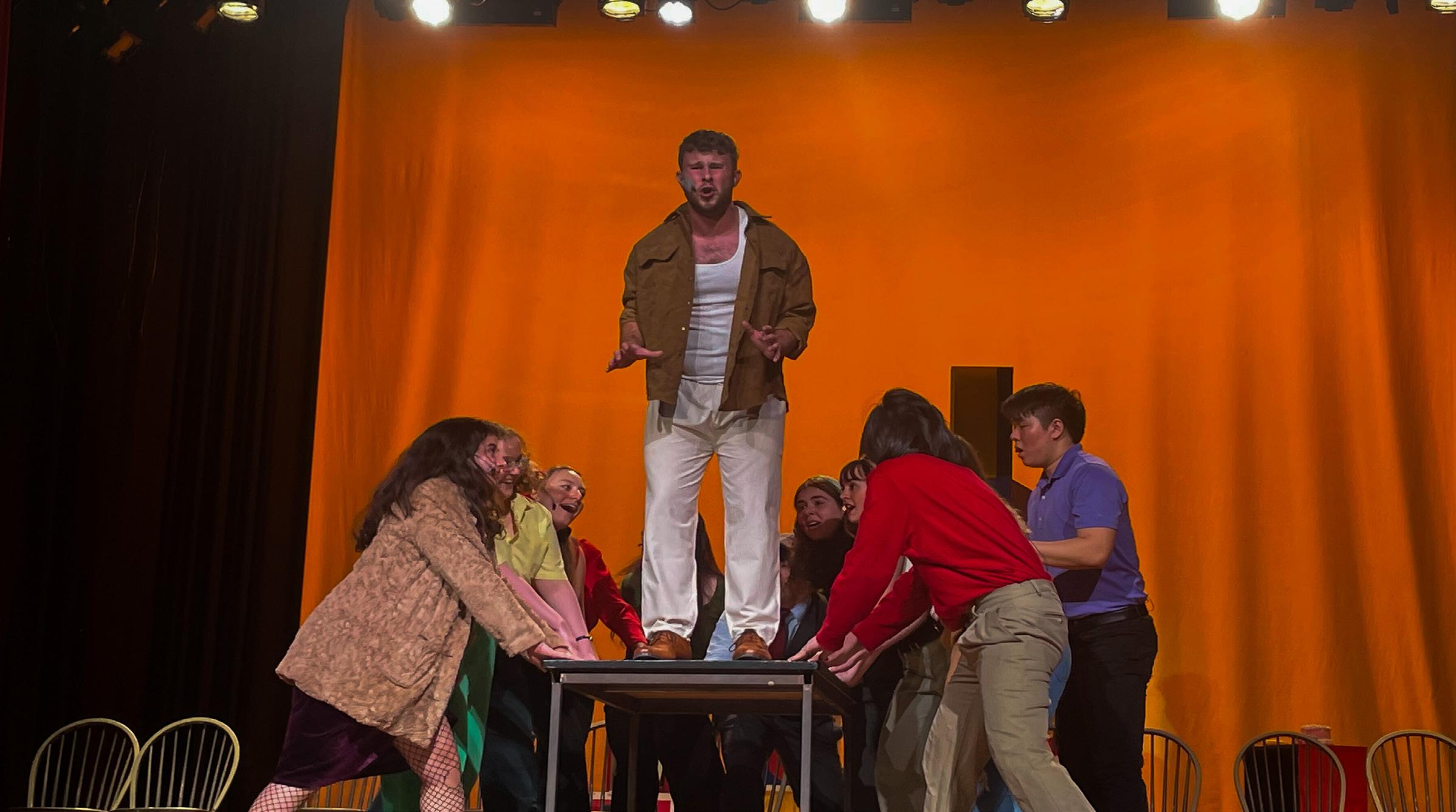
“It really is a show about why we do what we do and reckoning with if (Jon) wants to live a life based on the pure love of what he’s doing, or fear of everything around him,” he said. “I felt like it’s such a message that could resonate with a lot of us, especially as college students.”
“Time is ticking by and it’s all about deciding if you want to live your life guided by love or fear, and that’s what we’re doing here,” Winoto added.
For Diana-Abasi (Didi) Archibong ’26, who played Karessa — a woman who worked alongside Jon in the cast of his production — Ensemble’s production was her first performance in a musical at Brown.
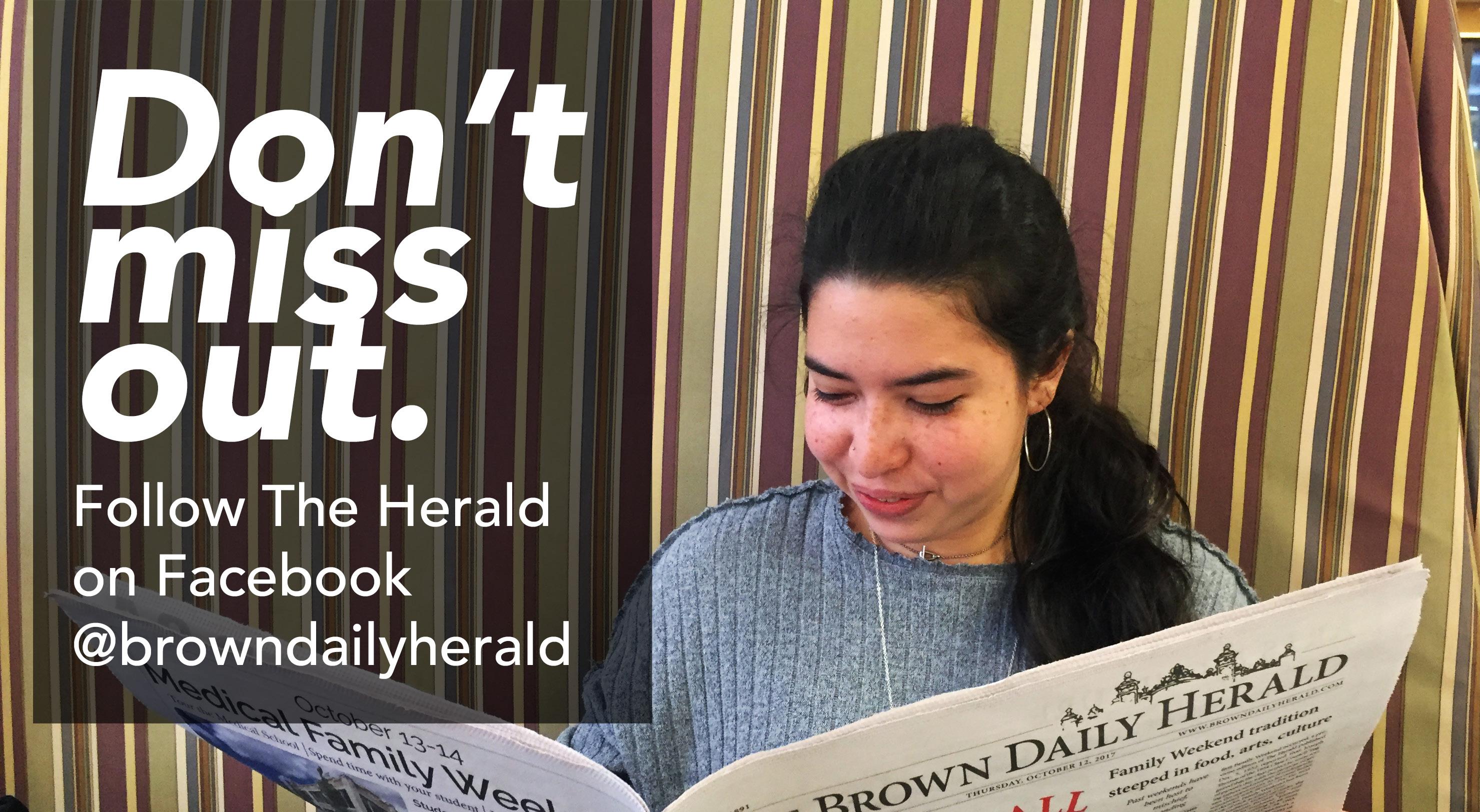
“I’ve performed in theater for most of my life, but stepped back by senior year (of high school) to focus on school. Returning to the theater world and debuting as Karessa was a return to family,” Archibong said, adding that the performance was “an opportunity to both perform and expand my family at Brown.”
Archibong noted that the cast was “so supportive and kind toward one another.”
“I felt safe and respected in an environment where I am loved just as I am,” she added.
Winoto commended the cast’s “commitment to the show and each other.”
“We have a really solid cast and everyone came together so well,” he said. “They’re giving a lot of energy and that’s really what I’m looking for with this show.”
Audience member Aidan LeBlanc ’25 told The Herald he enjoyed Ensemble’s rendition of “Tick, Tick… Boom!” for its originality and energy.
“The show’s music was incredible,” he said. “The band and the cast did a great job of bringing this experience to life.”
“The message that I really hope the audience gets out of the show is that it’s far more than a musical theater story,” Winoto said. “It’s real life. Life is driven by fear and love and life is short.”
M ONDAY, Ap RIL 17, 2023 5 THE BROWN DAILY HERALD | NEWS
ENSEMBLE FROM PAGE 1
SOFIA BARNETT / HERALD
Diana-Abasi (Didi) Archibong ’26, who played Karessa, said the cast of “Tick, Tick… Boom!” was “so supportive and kind toward one another.”
Higher Ed roundup: Harvard faces backlash after controversial donation
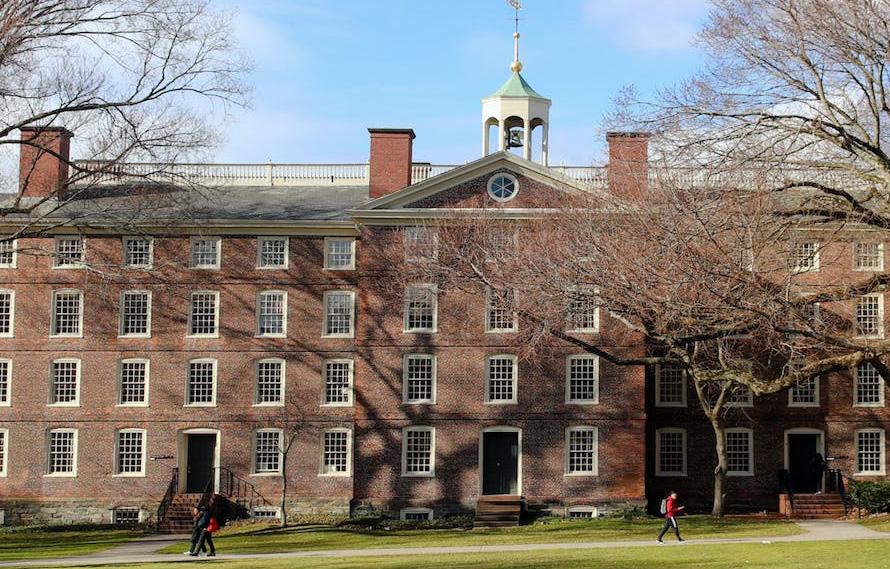
Survivors criticize princeton’s Title IX policies, faculty strike at Rutgers University
BY SAM LEVINE AND JACOB SMOLLEN
UNIVERSITY NEWS AND METRO EDITORS
Content warning: This article includes references to sexual assault.
This month, Harvard accepted a controversial donation from a Republican mega-donor, and survivors of sexual assault at princeton shared their experiences navigating the university’s Title IX processes. Meanwhile, unions at Rutgers reached a tentative agreement amid one of the largest strikes in higher education history.
Harvard faces criticism for accepting donation from Republican mega-donor
Harvard class of 1989 alum Kenneth Griffin recently made a $300 million donation to his alma mater, the university announced Tuesday. As a result, Harvard’s Graduate School of Arts and Sciences will be renamed after the billionaire hedge fund CEO, the Harvard Crimson reported.
The donation has been criticized by students and Harvard faculty, with some suggesting that the university should have declined the money. Griffin donated almost $60 million
to Republican candidates running for election in 2022. He is also a public supporter of Florida Governor Ron DeSantis and Florida’s “Don’t Say Gay” legislation.
Some community members defended Griffin and his donation, telling the Crimson that a donor’s political views should not be considered. The gift is not the first time that Griffin has given to Harvard — according to the Crimson, he has donated over $500 million in total.
Students detail experiences with Princeton’s Title IX Sexual Harassment Policy
At princeton, students have raised concerns about the university’s Title IX Sexual Harassment policy, the Daily princetonian reported. Five survivors of sexual assault at princeton detailed their experiences with the policy, including the dilemma of choosing between a formal process and an informal pathway wherein the parties “negotiate a mutual agreement.”
Survivors of sexual assault told the princetonian that the complex formal process lasted months, included invasive questions from investigators and forced survivors to relive traumatic experiences through extensive hearings.
Since the alternate informal avenue was created in July 2020, most students going through the university’s Title IX process have chosen this route. Though the informal process is faster than the formal proceeding, it requires both the
approval of the student filing the complaint and the alleged perpetrator and cannot lead to suspension or probation, according to the princetonian. As a result, some students have said they were disappointed by the outcomes of their complaints.
Rutgers, unions at university reach tentative agreement amid weeklong strike
At Rutgers University, three unions representing part-time lecturers, fulltime faculty, graduate workers and postdocs reached a tentative agreement
with the university after a weeklong strike over a lack of progress made in contract negotiations.
The unions announced their intention to strike April 9 and demanded that the university agree to contracts that include higher salaries, guaranteed funding for graduate students and increased job security for part-time lecturers. The tentative agreement addresses many of these demands.
The strike was one of the largest in the history of American higher education, with New Jersey Governor phil Murphy personally intervening to stop
the university from taking legal action against the work stoppage and help the parties reach a resolution.
As the agreement awaits ratification by each of the unions, classes are set to resume April 17, according to an update on the Rutgers website. While the university said the strike officially concluded, the unions have referred to the agreement as a strike “suspension” — leaving open the possibility of resuming the strike should the parties fail to reach a resolution on other matters up for negotiation, the New York Times reported.
SINCE 1891
THE BROWN DAILY HERALD
Head Opinions Editor
Alissa Simon
Opinions Editors

Anika Bahl
Bliss Han
Melissa Liu
Jackson McGough
Multimedia

Illustration Chief
Ashley Choi
Photo Chiefs Elsa Choi-Hausman
Dana Richie
Emily Faulhaber
Coco Huang
Alyssa Sherry
Kaiolena Tacazon
Production
Copy Desk Chief
Brendan McMahon
Design Chief Neil Mehta
Design Editors
Sirine Benali
Maddy Cherr
Ashley Guo
Gray Martens
Holleb
Sam Levine
Neil Mehta
Haley Sandlow
Kathy Wang
Digital News Director of Technology
Swetabh Changkakoti
Opinions
Photo Editors
Mathieu Greco
Claire Diepenbrock
Lilly Nguyen
Kaiolena Tacazon
Social Media Chief
Sahil Balani
Social Media Editors
Business General Managers
Joe Belfield
Andrew Willwerth
Sales Director
Alexander Zhou
Finance Director
Eli Pullaro
Submissions: The Brown Daily Herald publishes submissions in the form of op-eds and letters to the Op-eds are typically between 600 and 900 words and advance a clear argument related to a topic of campus discourse. You can submit op-eds to opinions@browndailyherald.com.

Letters to the editor should be around 250 words and respond to an article or column that has appeared in The Herald, or critique or commend The Herald’s editorial decisions. You can submit letters to the editor to letters@browndailyherald.com.
Submissions undergo multiple rounds of editing. These rounds of editing generally take place over the course of one evening, and you may have to respond to edits late in the evening. If you know you will be unable to do so, please mention that in your email, and we will do our best to work with you.
Submissions can build on reporting from The Herald, reporting elsewhere, official statements from the University or other groups and other reputable sources, but they cannot break news or contain information that The Herald cannot verify. Because we cannot publish unsubstantiated information, failure to provide appropriate sources may mean we have to modify or remove unverified claims.
The Herald will not publish anonymous submissions or submissions authored by organizations. Leaders of student organizations can be identified as such but cannot write under the byline of their organization.
The Herald cannot publish all submissions it receives and reserves the right to edit all submissions.
All submissions to The Herald cannot have been previously published elsewhere (in print or online — including personal blogs and social media) and must be exclusive to The Herald. Once your submission is published in The Herald, The Brown Daily Herald, Inc. owns the copyright to the materials.
Commentary: The editorial is the majority opinion of the editorial page board of The Brown Daily Herald. The editorial viewpoint does not necessarily reflect the views of The Brown Daily Herald, Inc. Columns, letters and comics reflect the opinions of their authors only.
Corrections: The Brown Daily Herald is committed to providing the Brown University community with the most accurate information possible. Corrections may be submitted up to seven calendar days after publication. Periodicals postage paid at Providence, R.I. Postmaster: Please send corrections to P.O. Box 2538, Providence, RI 02906.
Editorial Page Editor Kate Waisel
Julian Beaudry
Nadia Bitar
@the_herald facebook.com/browndailyherald
@browndailyherald
Advertising: The Brown Daily Herald, Inc. reserves the right to accept or decline any advertisement at its discretion. 88 Benevolent, Providence, RI (401) 351-3372 www.browndailyherald.com Editorial: herald@browndailyherald.com Advertising: advertising@browndailyherald.com
The Brown Daily Herald, Inc. is a financially independent, nonprofit media organization bringing you The Brown Daily Herald and Post- Magazine. The Brown Daily Herald has served the Brown University community daily since 1891. It is published Monday through Friday during the academic year, excluding vacations, once during Commencement and once during Orientation by The Brown Daily Herald, Inc. Single copy free for each member of the community. Subscription prices: $200 one year daily, $100 one semester daily.
Copyright 2023 by The Brown Daily Herald, Inc. All rights reserved.
6 M ONDAY, Ap RIL 17, 2023 THE BROWN DAILY HERALD | NEWS
@browndailyherald 133rd Editorial Board Editor-in-Chief Will Kubzansky Managing Editors Katy Pickens Alex Nadirashvili Senior Editors Augustus Bayard Caleb Lazar Peter Swope Kaitlyn
Post- Magazine Editor-in-Chief Kimberly Liu News Metro Editors Emma Gardner Rhea Rasquinha Jacob Smollen Julia Vaz Science & Research Editor Haley Sandlow Senior Science & Research Editor Gabriella Vulakh Arts & Culture Editors Aalia Jagwani Finn Kirkpatrick Rya
Sports Editor Linus Lawrence University News Editors Sofia Barnett Charlie
Emily
Grace
Torres
Vallabhaneni
Clynes
Faulhaber
UNIVERSITY NEWS
HERALD FILE PHOTO
Three unions at Rutgers University representing faculty, graduate students and postdocs reached a tentative agreement with the university after going on strike last week.
Wellisch ’26: Time flies, but that’s not a bad thing
As I come to the final weeks of my first year at Brown, I am struck by how fast the semesters flew by. It feels like yesterday my parents were frantically moving me into my dorm and I was nervously trying to meet people during orientation. After going through the arduous application process, this first year of college may have been one of the most anticipated phases of my life. And now, just like that, it’s over.
One-fourth of my college memories have already been created — and many of them are of hours spent working in the library. It’s unnerving to think that I might be passively spectating as this precious and scarce time escapes my grip.
As fast as this year has gone by, however, it does not feel uniquely quick. Birthdays and holidays seem to come around faster every year. Even globally, it has already been three years since the COVID-19 pandemic first started and over a year since Russia invaded Ukraine. I often find myself wondering, “Was that already a year ago?” And, my question, it turns out, is actually quite normal.
psychologists claim that the older we get, the faster time flies. This is because our brains are wired to detect change. Our retrospective outlook on time is determined by the number of new memories we have generated over a certain period. Unlike children, who are constantly absorbing new information and having novel experiences, the life of an adult — full of work and chores — is more routine, which means that
days and weeks blur together. As such, time is perceived to pass faster.
If you are anything like me, this can feel deeply unsettling.
It seems like our lives are something of a paradox. On the one hand, we are here for a very limited amount of time. It should behoove us to live a carefree life, absent of stress and im-
dichotomy of our adult lives.
However, even as I wish my first year hadn’t passed me by so suddenly, the combination of work and leisure is what made this time feel rewarding in the first place. By allowing this tension into our lives instead of resisting it, we can accept it as an essential feature of the human experience. Without the pressure to be finan-
ly seeking out new experiences and environments, pursuing new connections and learning new skills time can be slowed down, these lifestyle changes only affect our perception of time. Inevitably, time still passes us by, often more quickly than we’d like because of the monotony of adulthood. Rather than focusing on falsely comforting ourselves, we should reflect on our relationship with time and learn how to confront its inescapable truths. Much of our lives may be spent idling in our routines, but by recognizing them as necessary counterparts to moments of leisure, they too can be romanticized and celebrated.
The clock is always ticking, and moments will continue to pass by, but if we can ground ourselves in gratitude, we can dissolve the unsettling associations we have with time’s passage. While we may feel that we are wasting time in our work-focused days, the interplay between work and freedom is what ultimately gives our lives purpose and direction. Working hard is difficult and stressful, yet it is by feeling that pressure that we can unlock life’s beautiful pleasures.
mersed in passion, adventure and spontaneity. Yet, for many of us, in order to afford ourselves time for leisure and enjoyment, our competitive capitalist society demands that we dedicate much of our life to unfulfilling careers. The way I see it, our need for financial stability and our desire to make the most of our finite time on earth are two conflicting forces that define the
cially stable, I fear we may lose much of the incentive to achieve. If society provided for all of our needs, what goals would we still be motivated to accomplish? Understanding this paradox allows us to manage this tension and gives us the agency to dance between both worlds — work and freedom.
Although some experts claim that by active-
Yael Wellisch ’26 can be reached at yael_ wellisch@brown.edu. Please send responses to this opinion to letters@browndailyherald.com and other op-eds to opinions@ browndailyherald.com.
Support The Herald

www.browndailyherald.com/donate
Attending an Ivy League institution such as Brown is an incredible privilege. Not only are we privy to an astonishing range of resources and top-notch faculty, but we are constantly surrounded by bright peers who push us forward. This brilliance is so commonplace that it’s easy to take for granted. people come here with big dreams and often hope to change the world. Yet as we approach the end of another academic year, it’s worth reflecting on what it is our graduates actually end up doing. For a place as liberal and diverse as Brown, one might think that graduates go on to pursue a range of meaningful careers such as those in public service, research, the nonprofit sector or the arts. Yet in 2021, 51% of employed graduates who responded to CareerLab’s survey ended up in just three fields — finance, consulting and tech. Equally concerning is that 40% of last year’s graduates concentrated in economics, computer science, applied math or some combination thereof. These data are striking, and we ought to ask why this is the case.
Now I want to be very clear, I am in no way disparaging these fields or reducing their value. It’s just that I find it hard to believe that one-fifth of undergraduates at a university as quirky as Brown dream of becoming investment bankers or management consultants when they grow up. I find it even more difficult to believe that Brown students, who commonly cite the Open Curriculum as their reason for choosing Brown, are so frequently enthralled by economics, computer science and applied math. During my first week at Brown, someone once told me that “the save the world to consulting pipeline goes crazy here.” As I have connected with my peers across grade levels, I’ve already begun to see it. An education concentrator adds on economics and eventually drops the original education degree. Or a visual artist becomes a tech
aspirant. Slowly, our wide-eyed dreams become whittled down and the “Incoming Summer Analyst” announcements grow ever more regular like a steady drum beat.
This is incredibly distressing to me.
Who will write my next favorite novel, or develop pharmaceuticals for my aging relatives or craft policies to mitigate climate change if not Brunonians? The phenomenon that I speak of
a personal pursuit as much as a utilitarian one. Degrees such as those in philosophy or English teach a way of thinking rather than a specific skill. But, with the rise of STEM and the increasing cost of education, this view seems harder for many to justify.
Many peers may rationalize this redirection as a necessary evil that will provide them with on-the-job training to pursue more meaning-
own path (something I myself have often done). As a result, our intellectual curiosity has been tainted by our pursuit of security.
One could rightly argue that it is an incredibly privileged position to say that we can all pursue our passions when, for many, a Brown degree enables social mobility. However, I think the very fact that we are here gives us that privilege to some extent; regardless of our concentration, we are highly employable by virtue of the Brown name. And further, it is okay to live a middle-class life. A peer once said to me in passing, “My high school teacher went to Cornell, that’s so sad,” as if those of us who pursue less flashy careers don’t deserve a world-class education. There is something — a lot even — to be said about education for the sake of education.
is not unique to Brown. In fact, one might even say it is mild here. This brain drain to these three industries is endemic across America’s top institutions, especially amongst our Ivy League peers. Yet when our brightest students so commonly abandon their passions we and the world are all poorer for it. Between the time we march inward through the Van Wickle gates and the time we march out, something has convinced many of us that there are only a few set paths to success — and that must change.
I believe that the overrepresentation of these fields and concentrations in part reflects a shift in mindset about what the value of education really is. In the past, education was seen as
ful employment down the line. With such clear pipelines and the promise of six-figure salaries, it’s easy to see why over-achieving Brown students so disproportionately end up in fields like finance, consulting or tech. However, what we often don’t realize is that now is precisely the time in our lives when it’s okay to take risks and even fail. Unrestrained by the responsibilities of family life, we can be at our most innovative. Instead of consulting on someone else’s dream, investing someone else’s money or building someone else’s startup, our early 20s should be a time for exploration. When one sees so many peers following these well-trodden paths, it becomes easy to second-guess and doubt one’s
As young people and Brunonians, we are incredibly blessed by both time and opportunity. I worry that as we grow older and put our passions by the wayside we will forget who we are and why we are here in the first place. I know that work isn’t everything, but it honestly just makes me so incredibly sad to see my peers’ talents go unrealized as we are slowly beaten down by the machine. Maybe I’m being dramatic, but every time I meet someone new here at Brown, I am just in awe. I want to see them see it through and fulfill their wildest dreams. So to all my classmates, please know that there are many paths to success, and we should explore them all. Let’s all become architects of not only our own education but our lives.
Tas Rahman ’26 can be reached at tasawwar_rahman@brown.edu. Please send responses to this opinion to letters@browndailyherald.com and other op-eds to opinions@browndailyherald.com.
M ONDAY, Ap RIL 17, 2023 7 THE BROWN DAILY HERALD | COMMENTARY
“Much of our lives may be spent idling in our routines, but by recognizing them as necessary counterparts to moments of leisure, they too can be romanticized and celebrated.”
Rahman ’26: ‘Save the world to consulting pipeline goes crazy’
“With such clear pipelines and the promise of six-figure salaries, it’s easy to see why over-achieving Brown students so disproportionately end up in fields like finance, consulting or tech.”
uting to the displacement of Native American peoples,” they said. “Events like these redefine what these spaces are … and indigenize” them.
Showing ‘people we’re still here’: Vendors at the Powwow
The powwow included a variety of vendors, many of whom had attended the event in previous years. Joshua Robinson, who is affiliated with the Narragansett Indian Tribe, said he comes “almost every year” to the Spring Thaw powwow to sell handmade goods from his mother.
Keiko Moreino, who is of pequot and Nottoway descent, has “been coming to this powwow for a long time.” Moreino creates “regalia-style clothes,” including “ribbon shirts, ribbon skirts (and) ribbon dresses.”
Some vendors said that the powwow serves as a reunion for local Indigenous people as the warm weather dawns. “It’s a time where we gather and we see people we haven’t seen in the winter time,” Moreino said. “It’s always a refreshing way to start the year.”
Cheyenne p ocknett-Galvin, a vendor at the event who is Mashpee Wampanoag, said the Spring Thaw powwow is “exciting for everybody who’s been home all winter” because it’s “the first Powwow to kick off the year.” At the powwow, pocknett-Galvin sold strawberry lemonade and Indian tacos for Sly Fox Den, a restaurant in Charlestown that she owns with her sister and mother.
Belinda Miliano, a vendor who identifies as part of the Passamaquoddy Tribe and Sipanyik, described the powwow’s attendees as “an extended family.”
She described being especially grateful for these spaces since the onset of the COVID-19 pandemic because they enable people to “spend time together and learn from each other.”
Miliano is a contemporary artist and beader who “started making dream-catchers when (she) was a little girl,” she said. “It wasn’t until I graduated from college that I really started experimenting more with beadwork,” which incorporates glass beads and porcupine quills that Miliano cleans and trims herself.
Miciah Stasis, from the Herring pond Wampanoag community, described her work as “a mixture of different things.”
In addition to doing quill work, dying and embroidering, Stasis works with the wampum shell, which is “special” to the east coast, she said. “Our people have been doing wampum work for thousands of years, it’s how we tell our stories, how we heal.”
Stasis said that the powwow is “good medicine” because it allows Indigenous groups to “celebrate each other and (show) people we’re still here.”
‘Empowering for me to be here’: Non-profit organizations at the Powwow
The Spring Thaw powwow also featured tables for nonprofit organi-
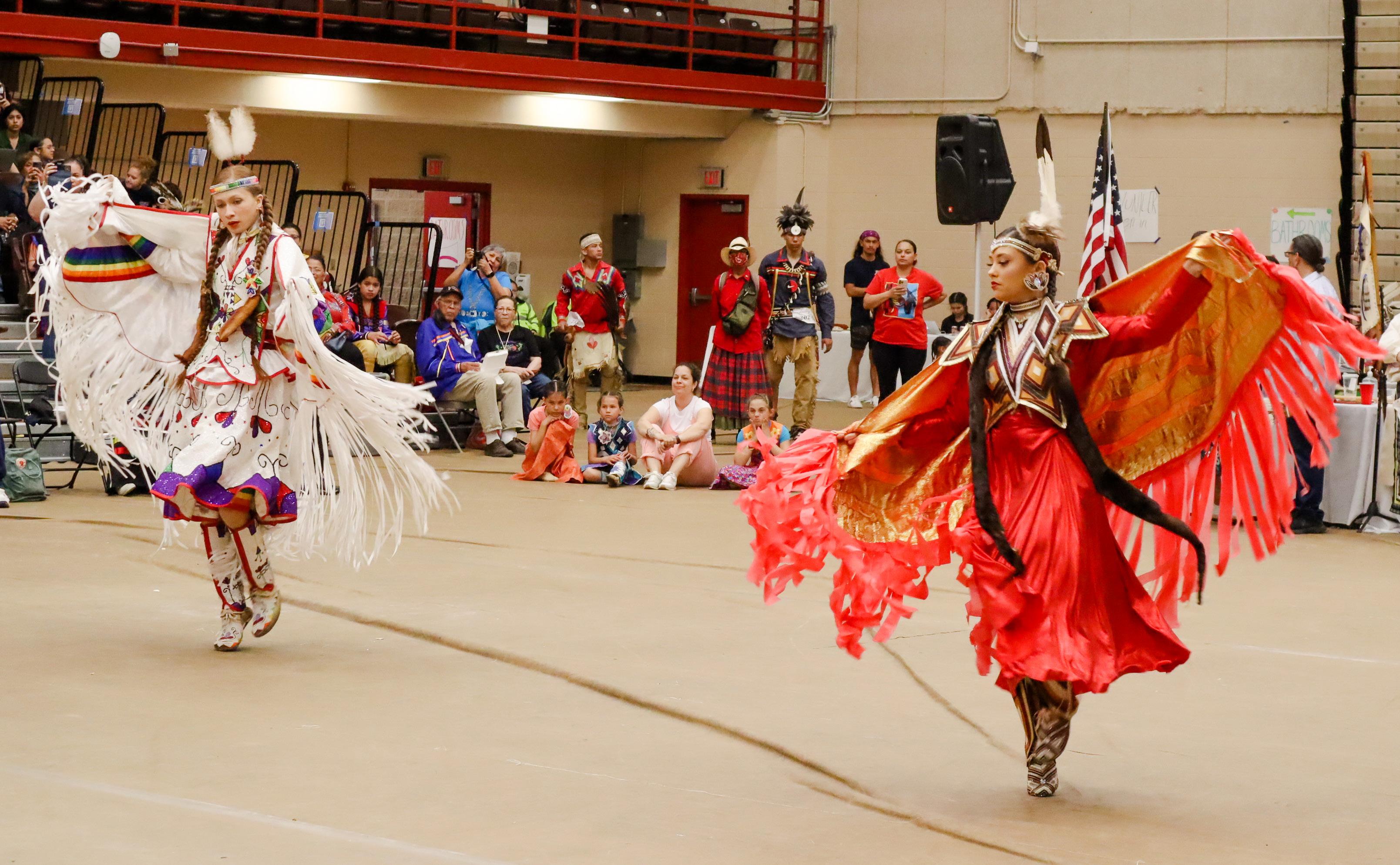
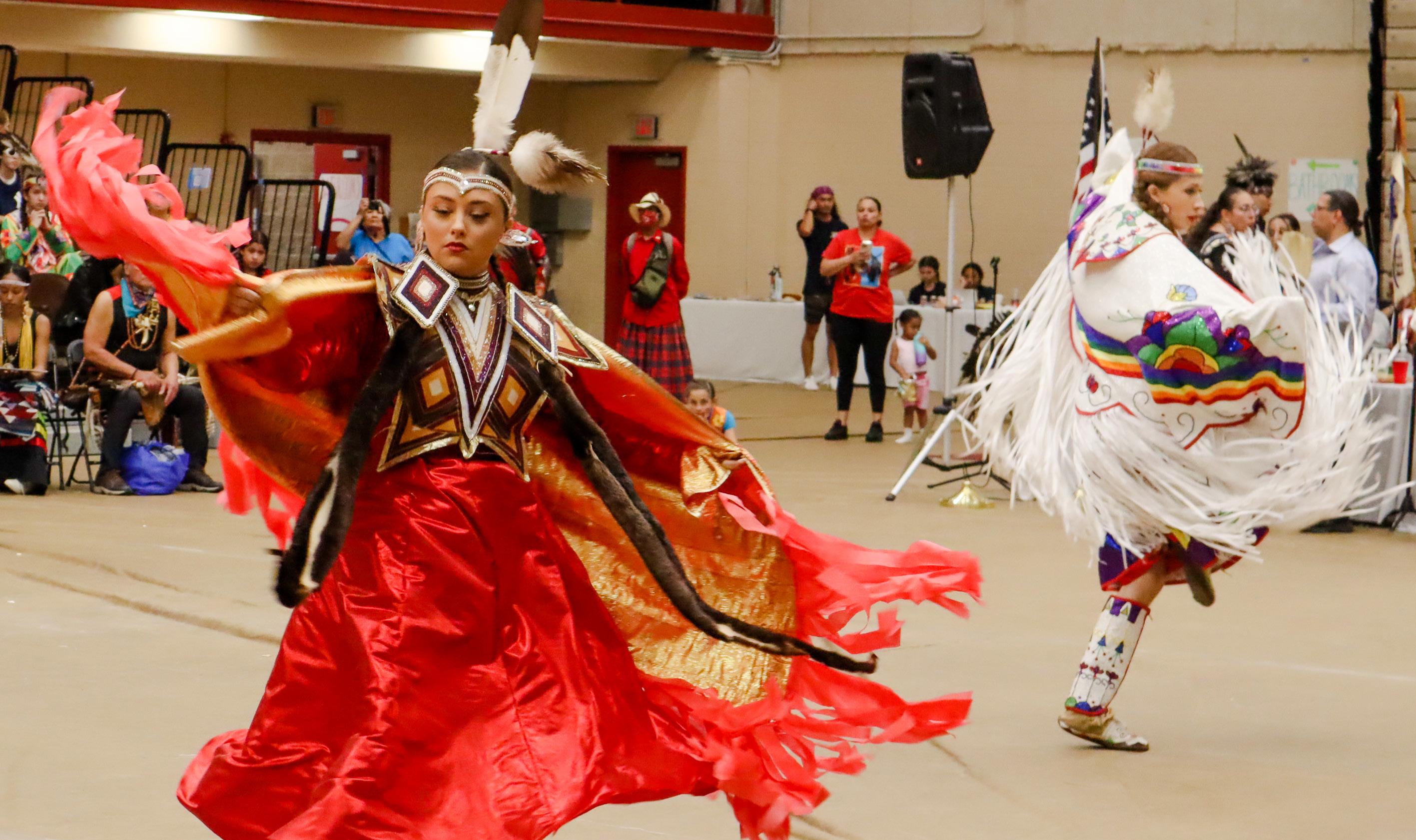
zations.
Nanette Thayer attended the powwow on behalf of the Rhode Island Indian Council’s Indian parent and Child Services, which is an “off-reservation program serving Rhode Island Native families to strengthen Native culture and reduce the incidence of child abuse,” according to a card for the organization at the event.
“The mainstay of the (Rhode Island
Follow us on Instagram!
Indian Council) has been the workforce program from 1975 forward, but in the last two years, we’ve added a child and parent services program that’s aimed at keeping Native families intact and well-supported,” Thayer said. “We’re trying to make sure that families are reaching their full potential.”
Reyna Symonds, who is Seaconke Wampanoag, was representing the Rhode Island Indian Council’s In -
digenous Empowerment Corp, which includes mentorship programs that encourage financial literacy. The organization aims “to help (participants) understand their culture and also get them to have basically generational wealth,” Symonds said.
Symonds described events like the powwow as “part of my culture.”
“It’s empowering for me to be here,” she said.
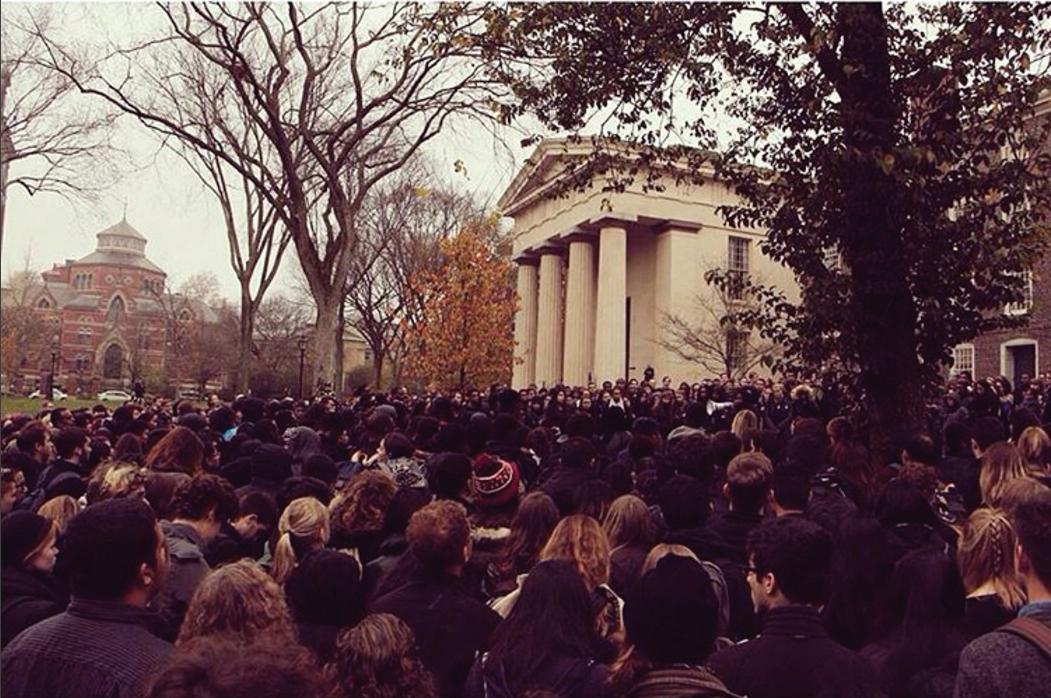
8 M ONDAY, Ap RIL 17, 2023 THE BROWN DAILY HERALD | NEWS
POWWOW FROM PAGE 1
Vendors at the Spring Thaw Powwow expressed joy at being able to reunite with community members, especially in light of the COVID-19 pandemic.
@browndailyherald
CLAIRE DIEPENBROCK / HERALD




















